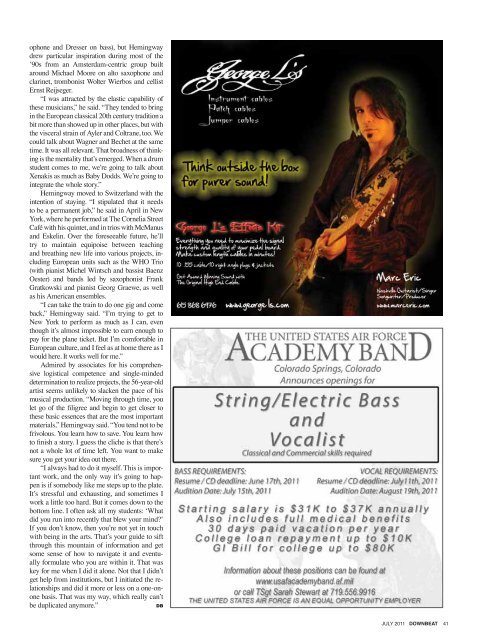Wessell Anderson Gerry Hemingway Dave Stryker John ... - Downbeat
Wessell Anderson Gerry Hemingway Dave Stryker John ... - Downbeat
Wessell Anderson Gerry Hemingway Dave Stryker John ... - Downbeat
Create successful ePaper yourself
Turn your PDF publications into a flip-book with our unique Google optimized e-Paper software.
ophone and Dresser on bass), but <strong>Hemingway</strong><br />
drew particular inspiration during most of the<br />
’90s from an Amsterdam-centric group built<br />
around Michael Moore on alto saxophone and<br />
clarinet, trombonist Wolter Wierbos and cellist<br />
Ernst Reijseger.<br />
“I was attracted by the elastic capability of<br />
these musicians,” he said. “They tended to bring<br />
in the European classical 20th century tradition a<br />
bit more than showed up in other places, but with<br />
the visceral strain of Ayler and Coltrane, too. We<br />
could talk about Wagner and Bechet at the same<br />
time. It was all relevant. That broadness of thinking<br />
is the mentality that’s emerged. When a drum<br />
student comes to me, we’re going to talk about<br />
Xenakis as much as Baby Dodds. We’re going to<br />
integrate the whole story.”<br />
<strong>Hemingway</strong> moved to Switzerland with the<br />
intention of staying. “I stipulated that it needs<br />
to be a permanent job,” he said in April in New<br />
York, where he performed at The Cornelia Street<br />
Café with his quintet, and in trios with McManus<br />
and Eskelin. Over the foreseeable future, he’ll<br />
try to maintain equipoise between teaching<br />
and breathing new life into various projects, including<br />
European units such as the WHO Trio<br />
(with pianist Michel Wintsch and bassist Baenz<br />
Oester) and bands led by saxophonist Frank<br />
Gratkowski and pianist Georg Graewe, as well<br />
as his American ensembles.<br />
“I can take the train to do one gig and come<br />
back,” <strong>Hemingway</strong> said. “I’m trying to get to<br />
New York to perform as much as I can, even<br />
though it’s almost impossible to earn enough to<br />
pay for the plane ticket. But I’m comfortable in<br />
European culture, and I feel as at home there as I<br />
would here. It works well for me.”<br />
Admired by associates for his comprehensive<br />
logistical competence and single-minded<br />
determination to realize projects, the 56-year-old<br />
artist seems unlikely to slacken the pace of his<br />
musical production. “Moving through time, you<br />
let go of the filigree and begin to get closer to<br />
these basic essences that are the most important<br />
materials,” <strong>Hemingway</strong> said. “You tend not to be<br />
frivolous. You learn how to save. You learn how<br />
to finish a story. I guess the cliche is that there’s<br />
not a whole lot of time left. You want to make<br />
sure you get your idea out there.<br />
“I always had to do it myself. This is important<br />
work, and the only way it’s going to happen<br />
is if somebody like me steps up to the plate.<br />
It’s stressful and exhausting, and sometimes I<br />
work a little too hard. But it comes down to the<br />
bottom line. I often ask all my students: ‘What<br />
did you run into recently that blew your mind?’<br />
If you don’t know, then you’re not yet in touch<br />
with being in the arts. That’s your guide to sift<br />
through this mountain of information and get<br />
some sense of how to navigate it and eventually<br />
formulate who you are within it. That was<br />
key for me when I did it alone. Not that I didn’t<br />
get help from institutions, but I initiated the relationships<br />
and did it more or less on a one-onone<br />
basis. That was my way, which really can’t<br />
be duplicated anymore.” DB<br />
JULY 2011 DOWNBEAT 41

















